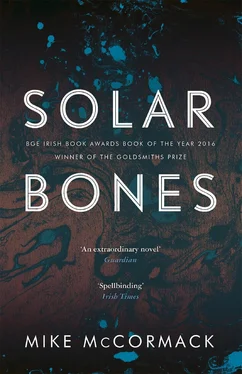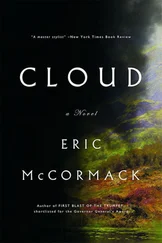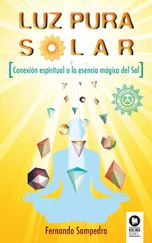big changes, mark my words
something of which he might have been referring to a few days later when a car pulled up at the gate and three men in suits and with party rosettes in their lapels came across the gravel towards us, two local men whose party affiliations we knew well and who were now leading the new party hopeful — the same candidate whose face I had seen in the morning mist and who now, in the flesh, presented himself as a tall man, well over six feet in a pinstripe suit, a man with an imperious air and an unusually long neck, a man who, even if he had not yet acquired the famous habit of speaking of himself in the third person had already about him an air of providential certainty, such was his bearing and his innate ability to look down on the world from a height as
the two men introduced him and he shook both our hands and asked me my name, correctly guessing that this would be my first time voting as he handed me a leaflet, this man with the side parting in his hair, listening while his canvassers gave a brief resume of his stellar career as a county councillor, ticking off all those local achievements which could be credited to his name — road surfacing, the new health dispensary, the extension to the local national school and the water filtering plant — some of the facilities he had agitated for and been present at the opening of — a broad swathe of achievement in local government which was all well and good they conceded, but it was now time for him to step up to national level where the power and influence resided, something which of course could only be of benefit to this western part of the constituency because, as was well known, it was ten years, more even, twelve, since this part of the county had a Dáil representative and it was past time there was a strong voice from this area to vent local concerns so that any stroke at all after his name on the ballot paper would be welcome and
I stood with my father at the gable of the house, sifting these weighty issues and savouring a fine sense of importance that the nation’s political process had come courting me and my vote, that it had taken the time to cross the country and shake my hand and make its case before me as it would any other man whose name was on the electoral register and who wielded the single transferrable vote and the idea that I was a citizen with consequential stake in these matters had such lasting effect upon me that, from that day to this, I have never failed to vote in any election and that while I may not hold to the one-true-political-faith anymore and I have, through the years, voted left, right and centre, each time doing so with some shade of that solemn meeting at the gable of the house renewing itself and prompting me, time and again that sense of consequence which attends putting a stroke on a ballot paper coming to me in the privacy of the voting booth as it did when
polling day came around on June 16th and our local national school was made over as a polling station with all its gates and the concrete wall surrounding the playground covered with the banners and posters of both parties, blue and green, jostling and overlapping each other on poles and pillars where men I knew since childhood stood with rosettes in their lapels handing out leaflets, pressing them into my hand on the off-chance that my decision might still be in the balance and could be swayed one way or the other by a leaflet at this last moment as I went into the middle room of the school and stood over the election officer, watching as he turned the pages of the register to find my name recorded there in blue ink before using a pen and ruler to strike through it with a single line as if obliterating it for all eternity before he handed me the stamped ballot paper with its list of candidates, which I took to the curtained cubicle at the other end of the classroom and ticked off my preferences, one, two and three in the boxes opposite the candidates’ names before folding it once across the centre and dropping it through the slot in the black ballot box
the single transferrable vote
amen
the electoral instrument so ingrained in the political psyche that it must surely be possible now to isolate its neural correlate, a twitching cluster of synapses to which we could point as proof that democracy in all its shades and hues inheres in our very souls, landslides and single-party rule, minority governments and coalitions, hung Dáils and all part of the very fabric of our being, after which
I stepped outside, my vote cast, my first say in the fate or destiny of my country and even if I did try to wear that responsibility lightly there was some urgency in the air which went beyond the result of a general election, something which later that night was not soothed by the nine o’clock news bulletin which confirmed that polling booths around the country were reporting an unusually high turnout, well over seventy per-cent which was impressive even for a country whose electorate were always keen to exercise their franchise as
the whole thing became clear the following morning when, within a few hours of the first ballot boxes being opened, tallymen in counting centres throughout the country began reporting a massive swing to the opposition, a double-digit surge which looked likely to sweep them to single-party government with an unprecedented majority of nearly twenty seats, a majority near-as-dammit to my father’s prophecy, which had me listening open-mouthed to the coverage throughout the day, when so many sitting TDs of the National Coalition began the inexorable process of losing their seats across the country, north, south, east and west, swept aside in both urban and rural constituencies by a tidal wave of electoral rejection which was now taking its full revenge on the government for four years of rising unemployment figures, inflation and a whole ream of other grievances so that
by midday a steady marching pace was set for the cull which swept through the country, dropping a slew of sitting deputies in marginal constituencies who went down to small percentage swings, back benchers and cabinet ministers toppling also in a steady rhythm, the government’s officer class totally decimated by the time the leader of the National Coalition came on television later that night to concede defeat with his face fixed in an interminably long and silent opening shot before he finally spoke, his voice ragged with shock, telling the nation what it already knew, that the people had spoken so unequivocally it had left him with no option but to resign and hand over the reins of government to the opposition with all best wishes for the future, a resignation stiff with grace but that did not fully plumb the depths of the electoral disaster his coalition had undergone, so that we had to wait till early the next morning
before we got the full figures, the results of those late counts that had continued on after the close of broadcasting, the definitive nature of the victory clear and impressive now as commentators picked through the bones of the carnage, none of their reports quite catching the proper sense of epochal change which hung over the country that morning, something greater than a change of dispensation, something with a hidden force biding its time within those astonishing figures, reluctant to disclose itself just yet so that for a while commentators confined themselves to speaking in terms of a sweeping tidal movement that had carried the opposition party to power and while the image was clear, its broad application rolled over that grain of unease which grated at the heart of what had happened and around which some coherent anxieties would make themselves clear in the coming days as the drama of the opposition party being swept so triumphantly to power gave way
to a whole new set of considerations — what would this single party majority do now, this assembly with all its new faces — no less than seventeen new deputies — how would they comport themselves in terms of building a government, how would it fulfil the extravagant assurances of its election manifesto and to what degree would it fall short of all it had promised on the hustings, all of which to my mind, was slightly distant and beside the point as my own immediate attention dwelt on the fact that with my first vote I had positioned myself on the winning side, not merely in party terms, but also with regards the specific candidate I had voted for — the tall man who’d shook my hand and canvassed my vote at the gable of the house had topped the poll over the heads of the other oppositional candidate whom, early in the afternoon, he had vanquished on the third count, taking his seat with an eventual surplus of over a thousand votes to be bounced on the shoulders of party workers and volunteers who punched the air and sang
Читать дальше












